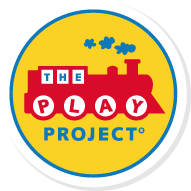 What are you doing?
What are you doing?
What happened?
Why did you do that?
Why are you mad?
These are some common examples of questions that many parents ask their children every day without necessarily thinking about their child’s ability to answer each question appropriately. Common child responses to these questions might include:
playing nothing because… I don’t know
Of course in some cases, children do not respond at all. This may mean one of two things: (a) the child was not paying attention, or (b) the child did not understand the question. So how can parents be sure that their child is capable of understanding and responding to wh-questions? The answer can be found by exploring the 6 Functional Developmental Levels (FDLs).
One of the first things parents learn in The P.L.A.Y. Project is that their child’s ability to engage with another person is impacted by his ability to self regulate and share attention. Self regulation (i.e. a calm and alert state) and shared attention are first learned in FDL 1, which corresponds with the first 3 months of life. Regardless of age, a child’s ability to function at his highest level of potential is contingent upon the skills learned in this stage of development. This is why it is so important to recognize when a child is calm and attentive (and available for engagement) versus when he is not.
One of the second things parents learn in The P.L.A.Y. Project is that their child’s capabilities (and current potential) are best determined by his primary FDL, not by his age. This is how we recommend that parents determine when a child is capable of understanding and responding to wh-questions. Most child development specialists would agree that children begin using single words around 12-18 months (FDL 4), and use meaningful 2+ word phrases around 18-24 months (FDL 5); however, a child’s understanding of these words (receptive language) begins much sooner. Using the FDLs as a guide, children should begin to demonstrate an understanding of basic wh- questions (i.e. where’s mommy? What’s that?) once they have developed the foundational skills within each of the first 4 FDLs. With the exclusion of childhood apraxia of speech or oral motor issues, upon entering FDL 5 parents can then expect their child to answer simple wh-questions. However, it is not until FDL 6 that children typically begin to answer complex, open-ended wh-questions, much like the questions listed at the beginning of this article. Open-ended questions, especially those that require an understanding ofreasoning and logic and the ability to recall past events, are not appropriate for children until they demonstrate solid skills within the first 5 levels. If children are challenged with complex wh-questions before FDL 6, they may be noted to respond with a scripted response that is unrelated to the actual question.
The practice of focusing on FDL before age is important when considering appropriate challenges for any child, especially those with special needs or autism. Keep in mind that even a simple question is a challenge, so consider your child’s FDL before asking. If you think your child is capable of answering wh-questions based on his FDL, but he is not responding or is not responding appropriately, ask your child’s speech therapist or your P.L.A.Y. Project Home Consultant for suggestions.
